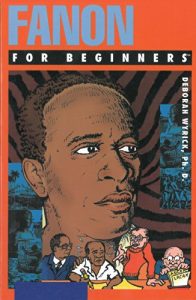Philosopher, psychoanalyst, politician, propagandist, prophet...although difficult to categorize, Frantz Fanon (1925–1961) is one of the most important thinkers of the 20th century and one of our most powerful writers on race and revolution.
The book opens with a biography, following Fanon from his birthplace of Martinique through combat in World War II and education in France, to his heroic involvement in the fights for Algerian independence and African decolonization. After a brief discussion of Fanon’s political and cultural influences, the main section of the book covers the three principal stages of Fanon’s thought:
The book opens with a biography, following Fanon from his birthplace of Martinique through combat in World War II and education in France, to his heroic involvement in the fights for Algerian independence and African decolonization. After a brief discussion of Fanon’s political and cultural influences, the main section of the book covers the three principal stages of Fanon’s thought:
- the search for black identity, as presented in Black Skin, White Masks, Fanon's stunning diagnosis of racism
- the struggle against colonialism, as explained in "A Dying Colonialism" and "Toward the African Revolution," essays centering on Algeria’s war of independence
- the process of decolonization, as analyzed in The Wretched of the Earth, the book that extended insights gained in Algeria to Africa and the Third World
Fanon For Beginners concludes by examining Fanon’s influence on political practice, such as the Black Power movement in the United States, on literary theory, and on political studies showing how his works and words continue to have a profound impact on contemporary cultural debate.e.






